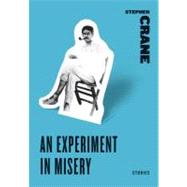
An Experiment in Misery
by Crane, StephenBuy New
Rent Book
Rent Digital
Used Book
We're Sorry
Sold Out
How Marketplace Works:
- This item is offered by an independent seller and not shipped from our warehouse
- Item details like edition and cover design may differ from our description; see seller's comments before ordering.
- Sellers much confirm and ship within two business days; otherwise, the order will be cancelled and refunded.
- Marketplace purchases cannot be returned to eCampus.com. Contact the seller directly for inquiries; if no response within two days, contact customer service.
- Additional shipping costs apply to Marketplace purchases. Review shipping costs at checkout.
Summary
Excerpts
Stories
Chapter One
The Monster
Little Jim was, for the time, engine Number 36, and he was making the run between Syracuse and Rochester. He was fourteen minutes behind time, and the throttle was wide open. In consequence, when he swung around the curve at the flower-bed, a wheel of his cart destroyed a peony. Number 36 slowed down at once and looked guiltily at his father, who was mowing the lawn. The doctor had his back to this accident, and he continued to pace slowly to and fro, pushing the mower.
Jim dropped the tongue of the cart. He looked at his father and at the broken flower. Finally he went to the peony and tried to stand it on its pins, resuscitated, but the spine of it was hurt, and it would only hang limply from his hand. Jim could do no reparation. He looked again toward his father.
He went on to the lawn, very slowly, and kicking wretchedly at the turf. Presently his father came along with the whirring machine while the sweet, new grass blades spun from the knives. In a low voice, Jim said, "Pa!"
The doctor was shaving this lawn as if it were a priest's chin. All during the season he had worked at it in the coolness and peace of the evenings after supper. Even in the shadow of the cherry trees the grass was strong and healthy. Jim raised his voice a trifle. "Pa!"
The doctor paused, and with the howl of the machine no longer occupying the sense, one could hear the robins in the cherry trees arranging their affairs. Jim's hands were behind his back, and sometimes his fingers clasped and unclasped. Again he said, "Pa!" The child's fresh and rosy lip was lowered.
The doctor stared down at his son, thrusting his head forward and frowning attentively. "What is it, Jimmie?"
"Pa!" repeated the child at length. Then he raised his finger and pointed at the flower-bed. "There!"
"What?" said the doctor, frowning more. "What is it, Jim?"
After a period of silence, during which the child may have undergone a severe mental tumult, he raised his finger and repeated his former word—"There!" The father had respected this silence with perfect courtesy. Afterwards his glance carefully followed the direction indicated by the child's finger, but he could see nothing which explained to him. "I don't understand what you mean, Jimmie," he said.
It seemed that the importance of the whole thing had taken away the boy's vocabulary. He could only reiterate, "There!"
The doctor mused upon the situation, but he could make nothing of it. At last he said, "Come, show me."
Together they crossed the lawn toward the flower-bed. At some yards from the broken peony Jimmie began to lag. "There!" The word came almost breathlessly.
"Where?" said the doctor.
Jimmie kicked at the grass. "There!" he replied.
The doctor was obliged to go forward alone. After some trouble he found the subject of the incident, the broken flower. Turning then, he saw the child lurking at the rear and scanning his countenance.
The father reflected. After a time he said, "Jimmie, come here." With an infinite modesty of demeanor the child came forward. "Jimmie, how did this happen?"
The child answered, "Now—I was playin' train—and—now—I runned over it."
"You were doing what?"
"I was playin' train."
The father reflected again. "Well, Jimmie," he said, slowly, "I guess you had better not play train any more to-day. Do you think you had better?"
"No, sir," said Jimmie.
During the delivery of the judgment the child had not faced his father, and afterwards he went away, with his head lowered, shuffling his feet.
An Experiment in MiseryStories. Copyright © by Stephen Crane. Reprinted by permission of HarperCollins Publishers, Inc. All rights reserved. Available now wherever books are sold.
Excerpted from An Experiment in Misery by Stephen Crane, Stephen Crane
All rights reserved by the original copyright owners. Excerpts are provided for display purposes only and may not be reproduced, reprinted or distributed without the written permission of the publisher.
An electronic version of this book is available through VitalSource.
This book is viewable on PC, Mac, iPhone, iPad, iPod Touch, and most smartphones.
By purchasing, you will be able to view this book online, as well as download it, for the chosen number of days.
Digital License
You are licensing a digital product for a set duration. Durations are set forth in the product description, with "Lifetime" typically meaning five (5) years of online access and permanent download to a supported device. All licenses are non-transferable.
More details can be found here.
A downloadable version of this book is available through the eCampus Reader or compatible Adobe readers.
Applications are available on iOS, Android, PC, Mac, and Windows Mobile platforms.
Please view the compatibility matrix prior to purchase.
